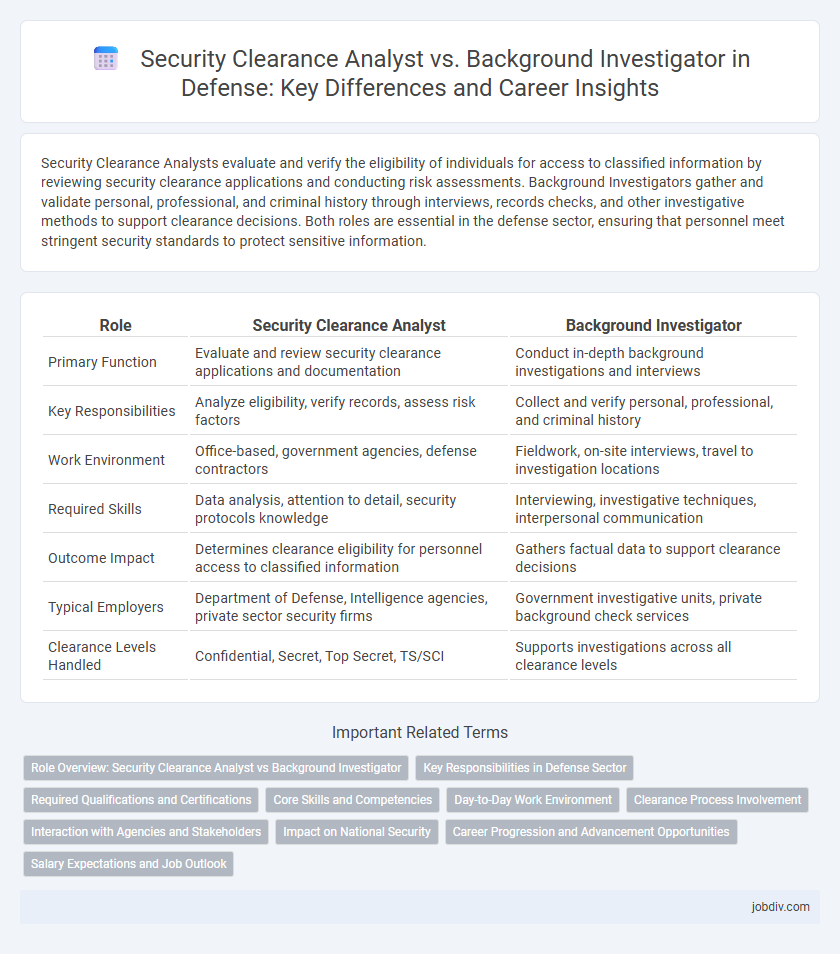Security Clearance Analysts evaluate and verify the eligibility of individuals for access to classified information by reviewing security clearance applications and conducting risk assessments. Background Investigators gather and validate personal, professional, and criminal history through interviews, records checks, and other investigative methods to support clearance decisions. Both roles are essential in the defense sector, ensuring that personnel meet stringent security standards to protect sensitive information.
Table of Comparison
| Role | Security Clearance Analyst | Background Investigator |
|---|---|---|
| Primary Function | Evaluate and review security clearance applications and documentation | Conduct in-depth background investigations and interviews |
| Key Responsibilities | Analyze eligibility, verify records, assess risk factors | Collect and verify personal, professional, and criminal history |
| Work Environment | Office-based, government agencies, defense contractors | Fieldwork, on-site interviews, travel to investigation locations |
| Required Skills | Data analysis, attention to detail, security protocols knowledge | Interviewing, investigative techniques, interpersonal communication |
| Outcome Impact | Determines clearance eligibility for personnel access to classified information | Gathers factual data to support clearance decisions |
| Typical Employers | Department of Defense, Intelligence agencies, private sector security firms | Government investigative units, private background check services |
| Clearance Levels Handled | Confidential, Secret, Top Secret, TS/SCI | Supports investigations across all clearance levels |
Role Overview: Security Clearance Analyst vs Background Investigator
Security Clearance Analysts evaluate and adjudicate candidate information to determine eligibility for access to classified information, relying on security guidelines and risk assessments. Background Investigators conduct in-depth interviews, verify personal and professional histories, and gather detailed evidence to support clearance decisions. Both roles are critical in maintaining national security by ensuring only trustworthy individuals receive appropriate security clearances.
Key Responsibilities in Defense Sector
Security Clearance Analysts in the defense sector evaluate and adjudicate personnel eligibility for access to classified information by reviewing investigation reports, risk factors, and compliance with security protocols. Background Investigators conduct thorough investigations including interviews, record checks, and fieldwork to gather detailed personal, financial, and employment histories of defense personnel. While Analysts focus on assessing security risks and making clearance decisions, Investigators collect and validate the information necessary for those security determinations.
Required Qualifications and Certifications
Security Clearance Analysts typically require a bachelor's degree in criminal justice, homeland security, or a related field, along with certification such as the Certified Security Clearance Professional (CSCP) credential. Background Investigators often need experience in law enforcement or investigative roles, supplemented by certifications like the Certified Background Investigator (CBI) or completion of the Department of Defense's Contractor Background Investigator Training. Both roles demand strong knowledge of security protocols, federal regulations, and the ability to assess sensitive information accurately.
Core Skills and Competencies
Security Clearance Analysts excel in evaluating and adjudicating personnel security information, demonstrating expertise in risk assessment, regulatory compliance, and decision-making under federal guidelines. Background Investigators specialize in in-depth data collection, interviewing, and verification, emphasizing investigative techniques, attention to detail, and comprehensive documentation skills. Both roles require strong analytical abilities, knowledge of security protocols, and proficiency in handling classified information.
Day-to-Day Work Environment
Security Clearance Analysts primarily focus on reviewing and evaluating security clearance applications by analyzing background information, ensuring compliance with federal regulations, and preparing detailed reports for adjudicators in office or secure environments. Background Investigators conduct fieldwork by interviewing applicants, verifying employment and personal histories, and gathering sensitive information through in-person investigations, often requiring travel and face-to-face interactions. Both roles are critical in the defense sector's security clearance process but differ significantly in work setting and daily activities, with analysts operating in structured office environments and investigators engaging in dynamic, field-based tasks.
Clearance Process Involvement
Security Clearance Analysts primarily review and validate documentation to ensure candidates meet established security standards during the clearance process. Background Investigators conduct in-depth interviews and gather firsthand evidence to verify an individual's history and suitability for access to classified information. Both roles are critical in the clearance process, with analysts focusing on analytical evaluation and investigators emphasizing field data collection.
Interaction with Agencies and Stakeholders
Security Clearance Analysts coordinate closely with federal agencies such as the Department of Defense and intelligence communities to evaluate personnel eligibility using comprehensive data reviews and risk assessments. Background Investigators engage directly with applicants, employers, and references to collect detailed personal histories, facilitating the accuracy and reliability of investigative reports critical for clearance decisions. Effective communication and collaboration with multiple stakeholders ensure thorough vetting processes and uphold national security standards.
Impact on National Security
Security Clearance Analysts play a critical role in national security by meticulously evaluating personnel eligibility for access to classified information, ensuring that only trustworthy individuals gain clearance. Background Investigators contribute significantly by conducting thorough investigations into candidates' histories, uncovering potential risks such as criminal records or foreign ties that could compromise security. Together, these roles form a comprehensive vetting process that prevents security breaches and maintains the integrity of defense operations.
Career Progression and Advancement Opportunities
Security Clearance Analysts often advance by specializing in risk assessment or moving into supervisory roles within security operations, leveraging their expertise in clearance adjudication processes. Background Investigators typically progress by gaining credentials in federal investigative standards or transitioning into federal law enforcement or intelligence positions. Both roles offer pathways to higher security management positions, with career growth contingent on experience, certifications, and inter-agency collaboration.
Salary Expectations and Job Outlook
Security Clearance Analysts typically earn between $60,000 and $85,000 annually, with job growth driven by increasing government and defense sector demands for personnel vetting. Background Investigators generally have salaries ranging from $50,000 to $75,000, benefiting from steady opportunities due to ongoing security checks and compliance requirements. Both roles show positive job outlooks as national security priorities intensify, with analysts often commanding higher salaries due to specialized evaluation responsibilities.
Security Clearance Analyst vs Background Investigator Infographic

 jobdiv.com
jobdiv.com